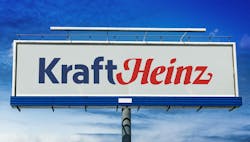Kraft Heinz to Receive $170M from DOE to Reduce Carbon Emissions by 99% Across 10 US Production Plants
The Kraft Heinz Company has been selected for award negotiations to receive up to $170 million from the US Department of Energy’s Office of Clean Energy Demonstration to deploy clean energy projects at 10 of the company’s US plants, which produce various food products.
The 10 sites included are Champaign, Illinois; Columbia, Missouri; Fremont, Ohio; Holland, Michigan; Kendallville, Indiana; Lowville, New York; Mason City, Iowa; Muscatine, Iowa; New Ulm, Minnesota; and Winchester, Virginia.
The investment will fund part of The Delicious Decarbonization Through Integrated Electrification and Energy Storage project to help the locations reduce annual emissions by more than 99% compared to 2022 levels.
“At Kraft Heinz, we’re on a journey to achieve net-zero greenhouse gas emissions by 2050,” said Marcos Eloi Lima, Chief Procurement and Sustainability Officer at Kraft Heinz. “This investment will give us critical resources to make necessary improvements in our plants to help increase their energy efficiency and reduce emissions.”
Kraft Heinz will utilize the funds to install heat pumps, electric heaters, electric boilers, anaerobic digesters, biogas boilers, solar thermal, solar photovoltaic, and thermal energy storage. The company expects the project to create an estimated 500 construction jobs across the 10 plant sites, providing opportunities for employees to receive additional training and develop new skills related to the new technologies.
The project will benefit the 10 plants by 2030, as estimated below (compared to 2022 levels):
- Overall energy use will decline by 23% after the implementation of energy efficiency measures, electrification, and onsite generation (from 1043 GWh/y to 801 GWh/year).
- Natural gas use will decline by 97%, with the remaining 3% being used for standby equipment.
- Total water use will be reduced by 3%.
Kraft Heinz has partnered with ENGIE, which provides strategic consulting, global reporting, and implementation support to corporations, governmental organizations, and municipalities on their net-zero journeys.
The company has also joined the U.S. Department of Energy’s Better Climate Challenge and Renewable Thermal Collaborative to collaborate across industries, exchange ideas, and share repeatable models, helping accelerate decarbonization across a wide range of food and beverage manufacturers.
About the Author
EnergyTech Staff
Rod Walton is senior editor for EnergyTech.com. He has spent 17 years covering the energy industry as a newspaper and trade journalist.
Walton formerly was energy writer and business editor at the Tulsa World. Later, he spent six years covering the electricity power sector for Pennwell and Clarion Events. He joined Endeavor and EnergyTech in November 2021.
He can be reached at [email protected].
EnergyTech is focused on the mission critical and large-scale energy users and their sustainability and resiliency goals. These include the commercial and industrial sectors, as well as the military, universities, data centers and microgrids.
Many large-scale energy users such as Fortune 500 companies, and mission-critical users such as military bases, universities, healthcare facilities, public safety and data centers, shifting their energy priorities to reach net-zero carbon goals within the coming decades. These include plans for renewable energy power purchase agreements, but also on-site resiliency projects such as microgrids, combined heat and power, rooftop solar, energy storage, digitalization and building efficiency upgrades.
